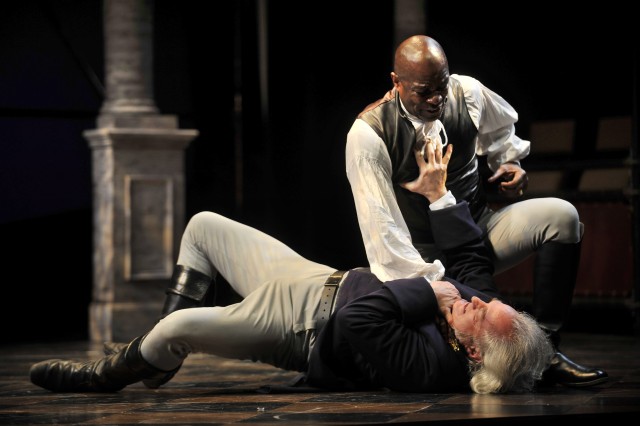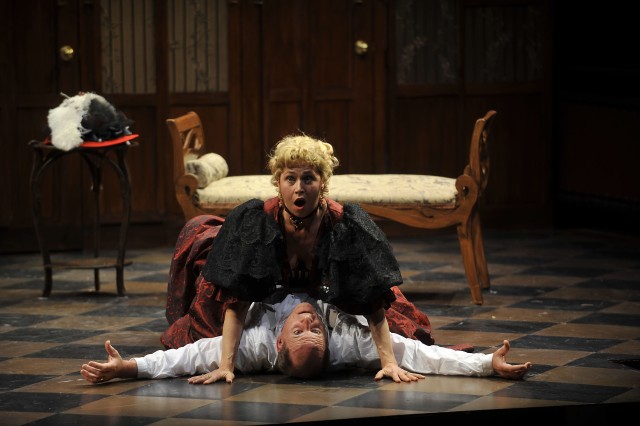“Americans are a very modern people, of course. They are a very open people too. They wear their hearts on their sleeves. They don’t stand on ceremony. They take people as they are. They make no distinction about a man’s background, his parentage, his education. They say what they mean and there is a vivid muscularity about the way they say it. They admire everything about them without reserve or pretence or scholarship. They are always the first to put their hands in their pockets. They press you to visit them in their own home the moment they meet you, and are irrepressible, good-humored, ambitious, and brimming with self-confidence in any company. Apart from all that I’ve got nothing against them.”
Tom Stoppard, Dirty Linen and New-Found-Land (courtesy of The Rat)
Archives for July 2008
TT: Wicked laughter
Today’s entire Wall Street Journal drama column is devoted to Shakespeare & Company in Lenox, Massachusetts. Here’s an excerpt.
* * *
 Part of what makes Shakespeare Shakespeare is that his plays are so rarely all of a piece. Even the most raucously funny of his comedies are shot through with sweetness, just as his tragedies usually make room for laughter–sometimes macabre, sometimes nervous, sometimes just plain silly. Not all directors are alert to the comic aspect of Shakespeare’s tragedies, though, which is one of the many reasons why I was so impressed by Shakespeare & Company’s first attempt at “Othello.” Staged by Tony Simotes, one of the company’s founding members, this “Othello” is lean, clean, detailed but unfussy and fast on its feet. Mr. Simotes’ actors wisely play many of their lines for laughs, thus making it all the more horrifying when the curtain falls on a stageful of corpses.
Part of what makes Shakespeare Shakespeare is that his plays are so rarely all of a piece. Even the most raucously funny of his comedies are shot through with sweetness, just as his tragedies usually make room for laughter–sometimes macabre, sometimes nervous, sometimes just plain silly. Not all directors are alert to the comic aspect of Shakespeare’s tragedies, though, which is one of the many reasons why I was so impressed by Shakespeare & Company’s first attempt at “Othello.” Staged by Tony Simotes, one of the company’s founding members, this “Othello” is lean, clean, detailed but unfussy and fast on its feet. Mr. Simotes’ actors wisely play many of their lines for laughs, thus making it all the more horrifying when the curtain falls on a stageful of corpses.
The tone is set by the Iago of Michael Hammond, a deceptively affable soldier-bureaucrat who keeps his seething ambition on the tightest possible rein. Throughout the first part of the evening, he might well have wandered in from a production of “How to Succeed in Business Without Really Trying.” Only in his soliloquies does he give the audience a glimpse of the green-eyed monster hiding behind his mask of urbanity. No less deceptive is John Douglas Thompson’s Othello, who speaks Shakespeare’s verse with terrific dash and elegance (and the faintest of African accents, a nice touch). Mr. Thompson comes across as a poised, aristocratic Othello, the last man in the world whom you’d expect to end up strangling his naïve young wife in a mad fit of jealousy….
 Shakespeare & Company, which performs throughout the year on a lovely three-stage campus nestled in the foothills of the Berkshires, doesn’t limit itself to the classics. The last of the current season’s three mainstage offerings is “The Ladies Man,” a free English-language adaptation of Georges Feydeau’s “The Ladies Dressmaker” by Charles Morey, who also created the excellent stage version of “The Count of Monte Cristo” produced last month by the Alabama Shakespeare Festival. Mr. Morey has deliberately softened the edge of Feydeau’s hard-headed 1885 comedy of sexual manners, turning it into a friendly five-door farce in the good-humored American manner.
Shakespeare & Company, which performs throughout the year on a lovely three-stage campus nestled in the foothills of the Berkshires, doesn’t limit itself to the classics. The last of the current season’s three mainstage offerings is “The Ladies Man,” a free English-language adaptation of Georges Feydeau’s “The Ladies Dressmaker” by Charles Morey, who also created the excellent stage version of “The Count of Monte Cristo” produced last month by the Alabama Shakespeare Festival. Mr. Morey has deliberately softened the edge of Feydeau’s hard-headed 1885 comedy of sexual manners, turning it into a friendly five-door farce in the good-humored American manner.
Mr. Morey’s adaptation (which also borrows from Feydeau’s “A Flea in Her Ear”) starts off slowly and contains a few too many obviously jokey jokes: “Five hundred dressmakers in Paris and you had to pick this one–no wonder the French invented farce!” But the dramatic gears mesh as soon as the doors start slamming, and the result is a most effective vehicle for the talents of Kevin G. Coleman, Elizabeth Aspenlieder and Jonathan Croy, the director and stars of the brilliant production of Tom Stoppard’s “Rough Crossing” that Shakespeare & Company put on last summer. Mr. Coleman screws the comic tension up to an excitingly shrill pitch in the second act, then discharges it in an explosion of inspired craziness….
* * *
Read the whole thing here, including my equally favorable remarks on Tina Packer’s staging of All’s Well That End’s Well.
TT: Almanac
“He disliked pretty girls who showed hysteria, particularly in the form of strong opinions.”
Angus Wilson, Anglo-Saxon Attitudes
TT: So you want to see a show?
Here’s my list of recommended Broadway, off-Broadway, and out-of-town shows, updated weekly. In all cases, I gave these shows favorable reviews (if sometimes qualifiedly so) in The Wall Street Journal when they opened. For more information, click on the title.
Warning: Broadway shows marked with an asterisk were sold out, or nearly so, last week.
BROADWAY:
• Alfred Hitchcock’s The 39 Steps * (comedy, G, suitable for bright children, reviewed here)
• August: Osage County * (drama, R, adult subject matter, reviewed here)
• Avenue Q * (musical, R, adult subject matter and one show-stopping scene of puppet-on-puppet sex, reviewed here)
 • Boeing-Boeing (comedy, PG-13, cartoonishly sexy, reviewed here)
• Boeing-Boeing (comedy, PG-13, cartoonishly sexy, reviewed here)
• Gypsy (musical, PG-13, adult subject matter, reviewed here)
• The Little Mermaid * (musical, G, entirely suitable for children, reviewed here)
• South Pacific * (musical, G/PG-13, some sexual content, brilliantly staged but unsuitable for viewers acutely allergic to preachiness, reviewed here)
OFF BROADWAY:
• The Fantasticks (musical, G, suitable for children capable of enjoying a love story, reviewed here)
IN GARRISON, N.Y.:
• Cymbeline/Twelfth Night (Shakespeare, PG-13, playing in repertory through Aug. 31, reviewed here)
CLOSING SOON ON BROADWAY:
• A Chorus Line * (musical, PG-13/R, adult subject matter, closes Aug. 17, reviewed here)
CLOSING SATURDAY IN WESTON, VT.:
• The Light in the Piazza (musical, PG-13, reviewed here)
CLOSING SUNDAY IN SUBURBAN CHICAGO:
• The Lion in Winter (serious comedy, PG-13, adult subject matter, closes Aug. 3, reviewed here)
TT: Almanac
“A great actress, but like most of them had no real idea of what she was playing. Actually she’d have been a better actress if she’d been a bit more of a fool. She’d have just acted instead of trying to make sense of her parts.”
Angus Wilson, Anglo-Saxon Attitudes
TT: Snapshot
Arturo Toscanini leads the NBC Symphony in a 1952 performance of the first movement of Beethoven’s Fifth Symphony:
(This is the latest in a weekly series of arts-related videos that appear in this space each Wednesday.)
TT: Almanac
“I never look at anything that isn’t beautiful these days unless duty compels me.”
Angus Wilson, Anglo-Saxon Attitudes
TT: Almanac
“The mention of rent put Frank on his mettle. ‘That’s all right, dear,’ he said; ‘you pay when you can.’
“Each time that he spoke this familiar phrase, and sometimes it was as often as twenty times in a week, he felt overcome by the sadness of the situation. It was seldom, he knew, that any good would come of his sympathy, but it was the hopelessness, the endless hopelessness of the lives with which he had surrounded himself, that awoke his compassion. Frank Rammage’s attitude could hardly be called sentimental, for it went farther than mere feeling–he regarded the dishonest and depraved as almost sacred. As usual, however, the little scene had satisfied the mixture of bullying and masochism that lay on the surface of his strange, Dostoyevskian philanthropy. He felt quite jolly.”
Angus Wilson, Anglo-Saxon Attitudes
